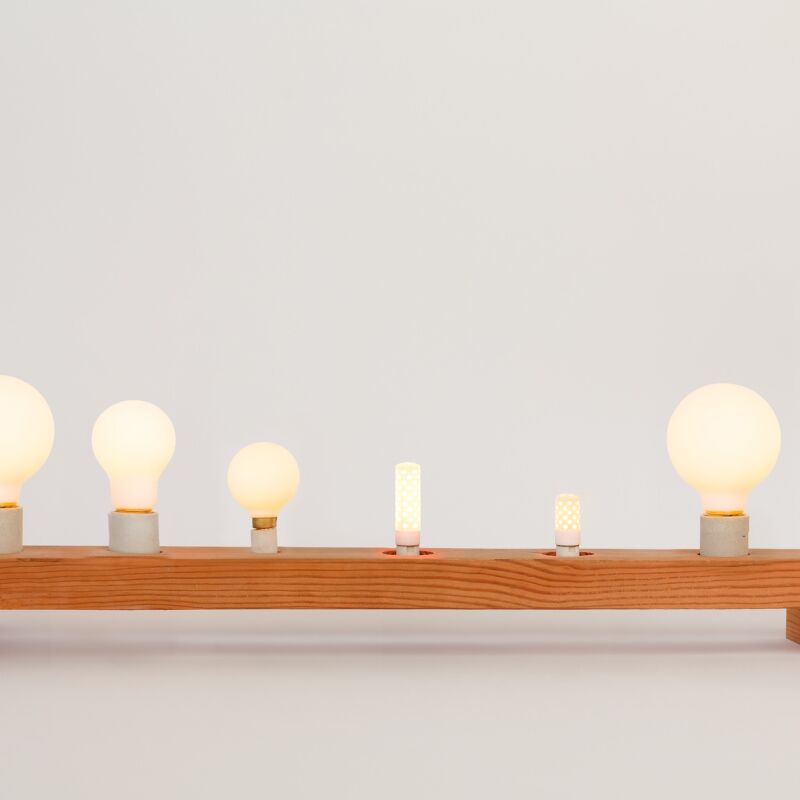Call me crazy, but I don’t like AC: I’d rather sleep in my stifling NYC apartment with a box fan pointed at me than turn on what feels like cold, artificial air. (Some people, I know, can’t imagine living without it—see Remodeling 101: Smart Air Conditioners if you fall in that camp.) To me, there’s something simpler and nostalgic about keeping cool in other ways: Bedside fans and open windows harken back to summer nights at camp or in the beach cottage. With that unplugged spirit in mind, we asked Jeremy Floto and Josh Farley, the designers and proprietors behind The Glen Wilde, a throwback 1940s bungalow community in the Catskills—recently renovated, but without AC—for their tips on keeping cool. Here are nine ways to beat the heat the good old-fashioned way.
Photography courtesy of The Glen Wilde.
N.B.: For more expert summer insight from the Glen Wilde folks, see Expert Advice: How to Open Up the Summerhouse for the Season.
1. Blow the hot air out.

To keep a room cool without AC, “it’s all about air circulation,” Floto and Farley say. “Blow the hot air out and bring the cool breeze in.” The Glen Wilde bungalows are outfitted with exhaust fans in the ceiling that pull the hot air up and out. Don’t have an exhaust fan built in? You can use a simple box fan: It sounds counterintuitive, but a fan pointing out the window, rather than toward the room, will “act as an exhaust fan and suck out the hot air,” the proprietors say.
2. Close the windows during the day.

When it comes to opening and closing windows, timing is key. Close the windows (and the shades) in the morning to keep the cool air in during the heat of the day (and keep the sun out).
3. Then, open them at dusk.

The reverse is true at night: “As dusk approaches, open your windows to let in the cool night air,” Floto and Farley say. Be sure the windows are screened to keep the bugs out.
4. Stock up on fans—and know how to use them.

On hot, still nights at the Glen Wilde, Floto and Farley open the windows all the way and position a fan in the window frame: “That way, the fan will suck in the cool air from outside while also creating a breeze,” they say. Or keep a bedside fan on hand, like the vintage fans in each Glen Wilde bungalow, and point it at the bed at night to “simulate an ocean breeze.”
5. Strip the bed.

For a cool night’s sleep, bring your bed back to basics. “For bed linens, we use 100 percent cotton,” Floto and Farley say. “Even though it’s hot up here during the day, since we’re in the mountains it cools off at night. We’ve found that the cotton/poly blend might be nice for superhot days, but overall the 100 percent cotton has good skin feel while still staying cool enough.” (They also air-dry sheets the old-fashioned way.) Instead of a quilt, Remodelista editors are known to use a simple sheet, draped across the bed, as a light top layer.
6. Dampen a sheet.

On particularly sweltering nights, invoke what’s sometimes known as the “Egyptian method:” Lightly dampen a top sheet with cool water and lie underneath it. (We like the idea of keeping a glass spray bottle at the bedside for easy dampening.)
7. Sit—or sleep—on the porch.

“Back in the day”—when Catskills summer communities were in their heyday—”the bungalows had sleeping porches,” Floto and Farley say. Make use of screened porches to catch a breeze, bug-free, at all hours of the day—or position a bed on the porch for an ideal summer night’s sleep.
8. Maximize shade.

When it comes to keeping a house cool, think about what’s outside as well as in. Planting shade trees or shrubs, depending on your area, will “shield the exterior from the hot sun.” The Glen Wilde bungalows benefit from stands of trees for outdoor meals in the shade.

When all else fails, try these DIYs from our post, 7 Tips for Getting a Good Night’s Sleep in Summer: “Try taking a cold shower before going to sleep and place a damp washcloth next to the bed. For more relief, make a rice sock: Fill a fresh sock with rice and tie it with a ribbon at the top. Place it in the freezer for a few hours and rest it around your neck or on your forehead as a cooling compress.” Or, simply put a washcloth in the freezer to cool it down for a bit.
(Interested in staying at the Glen Wilde? They welcome “anyone fun-loving,” they say. See their site to book via Airbnb.)
Can’t sleep? Try these tips:
- 10 Secrets for a Better Night’s Sleep
- Happier at Home: 7 Tips for Getting a Good Night’s Sleep in Summer
- 7 Tips for Creating a Low-Key Romantic Bedroom with Tricia Rose of Rough Linen
N.B.: This post is an update; the story originally ran on August 11, 2017.




Have a Question or Comment About This Post?
Join the conversation (4)